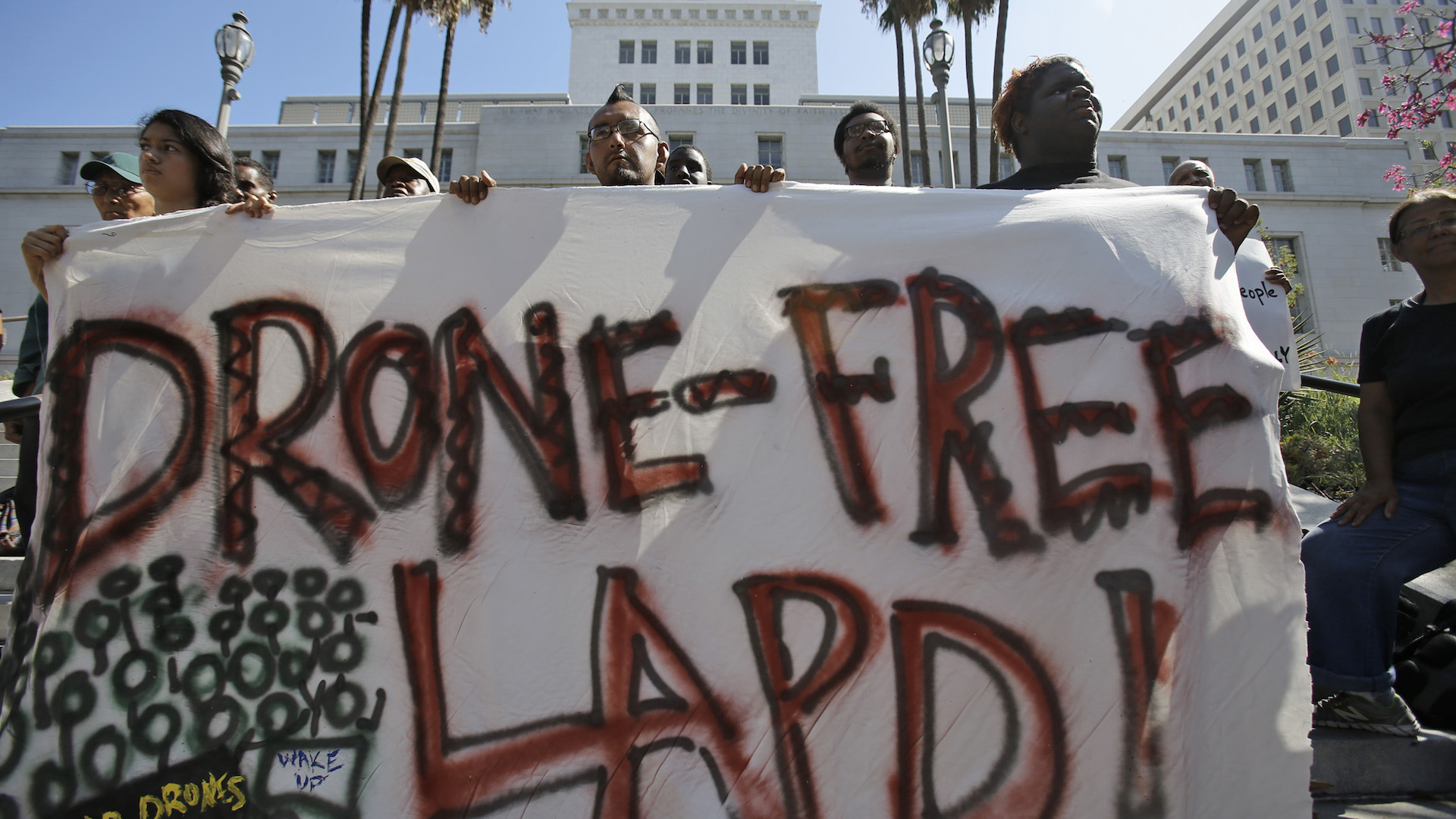

In the wake of the Las Vegas mass shooting earlier this month, local authorities were vying for the increased use of drones post emergencies. Unmanned aerial vehicles would allow for a real-time view of the crime scene while in progress, and could help boots on the ground coordinate and act with more information at hand. This week, a nearby police department received a nod from a civilian oversight panel to ramp up drone use. The Los Angeles Police Department was cleared for a yearlong testing and implementation of UAVs. Not everyone is thrilled.
According to the Los Angeles Times, the 3-1 vote in favor of increased drone use resulted in audible disagreement, which eventually turned to a sizable protest outside of the LAPD’s headquarters in downtown Los Angeles. This debate has been raging on for a few months now, and the opposition to law enforcement’s increase in drone use hasn’t receded. Citizens are nervous that the police will misuse this new tool of theirs, a fear not entirely misguided.
However, proponents of this new tool argue that camera-equipped drones would substantially keep both police officers and others out of danger, say, in a high-risk scenario where sending in an actual person could result in preventable violence. The pushback, of course, is that eternal vision of a 1984 society, where the oppressive power dynamic is tilted heavily in the authority’s favor.
The eye in the sky, a modern panopticon aided by our urge to keep pushing technology forwards. It’s a complicated discussion to walk into, as both sides are armed with understandable, logical arguments, and only time will tell if the net effect is positive or not. For example, is this a precedent for eventual armed UAVs? That might sound overly paranoid, but also like a natural evolution.
Naturally, the LAPD and police commissioners are promising thorough restrictions and considerable oversight of those in charge of piloting the drones. In addition, currently, weapons and facial-recognition software won’t be permitted to be implemented. Of course, there could be an entirely new discussion, regarding those two capabilities in the future.
“Mission creep is of course the concern,” Jim Lafferty of the National Lawyers Guild Los Angeles admits. “The history of this department is of starting off with supposedly good intentions about the new toys that it gets…only to then get too tempted by what they can do with those toys.” The response by the president of the LAPD’s union, Craig Lally, is as expected: Drones are “a tool that will protect both police officers and residents.”
“Whether it’s an active shooter at a school, or a suspect barricaded in a home in a Los Angeles neighborhood, this technology will help us save lives,” he added. Fortunately, the department is only interested in purchasing two drones for now, one for active use, and one as a backup should the former face technical issues. The two will be rolled out in the next month.
The process of whether or not to use a drone in any given situation seems fairly reasonable, as it’s currently expressed. Reportedly, only SWAT members will be allowed to fly UAVs, and only during specific, high-risk scenarios. In addition, search and rescue operations will be valid situations to use drones in, and would presumably face far less opposition than the drone-related enforcement of laws.
When looking for armed suspects with “superior firepower” or an “extraordinary tactical advantage,” drones will be permitted. Personally, these all make sense to me. Sending in a drone to get a clearer picture, instead of risking an officer’s life, is rational and effective.
The question ultimately boils down to what kind of society we want to live in. Are drones an overall positive tool to hand the LAPD? What about every police department in the United States? Does this set a dangerous precedent, for eventual armed drones, regardless of the current assurance that it doesn’t? Would we like our children to grow up in a neighborhood where drones patrol the skies, looking for potential criminals? It’s important not to dismiss these fears and anxieties, as so much of our former science-fiction has turned to reality. Humans adapt rapidly, and earlier principles and ideals are forgotten just as quickly. It’s a complicated issue, one where I agree with the concern of citizens, and the pleads by law enforcement to stop endangering their officer’s lives.
The LA Times reports that the yearlong program will result in a review, during which the program will be analyzed, before either being continued or disbanded. Stay tuned.